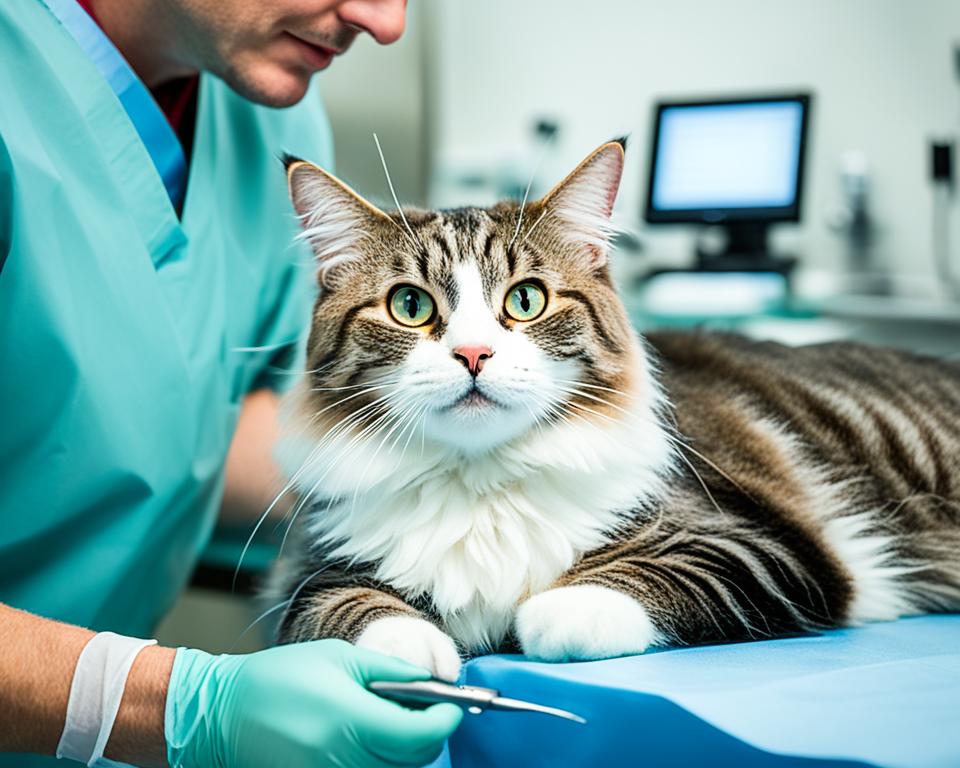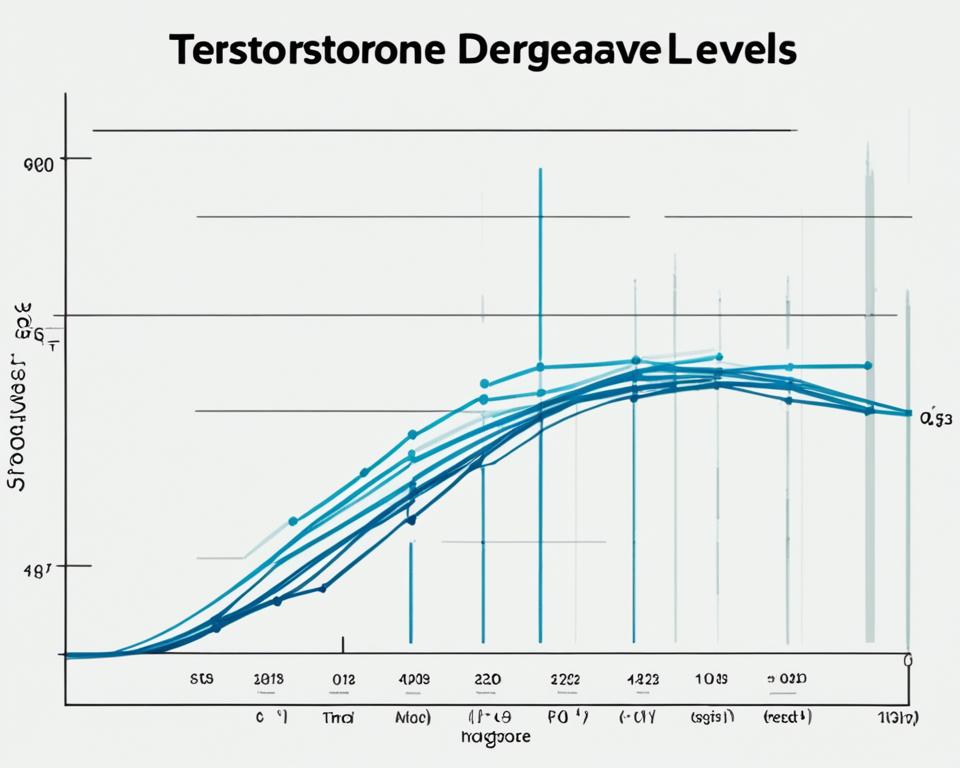How Long After Neutering Cat Is Testosterone Gone: A Complete Guide
Discover how long it takes for testosterone to disappear in neutered cats. Learn about hormonal changes, recovery, and the benefits of neutering for your feline friend.

Ever wondered how neutering changes your male cat’s behavior? Many cat owners are curious about this during the post-surgery period. Neutering is a common surgery for male cats. But, it affects testosterone levels and behavior in different ways.
Recovery from neutering is more than just healing physically. It also changes hormones, affecting things like appetite and aggression. It usually takes one to two months for testosterone levels to drop a lot. You’ll see slow changes in your cat’s behavior during this time.
Some cat owners see changes in as little as three days after surgery, like changes in appetite. It’s important to watch your cat’s weight during recovery. Neutered males can gain 20-28% of their body weight in six months. This guide will explain how testosterone levels decrease and what to expect during recovery.
Understanding the Neutering Process for Male Cats

Feline neutering is key to cat reproductive health. It helps control the pet population and benefits both male cats and their owners.
What is cat neutering?
Neutering a male cat means surgically removing his testicles. This surgery is done under anesthesia and requires two small cuts in the scrotum. Cats usually go home the same day and take about 7 days to fully recover.
Benefits of neutering male cats
Neutering has many benefits for cats and their owners. It cuts down on roaming and lowers accident risks. Neutered cats tend to be less aggressive with other males and more loving to their owners. It also greatly reduces urine odor, though it might not stop it completely.
The surgical procedure explained
The neutering process is fast and straightforward. Vets do the surgery under general anesthesia, making small cuts to remove the testicles. If a cat has undescended testicles, a more complex surgery is needed.
After surgery, cats might feel some discomfort for about 36 hours. But, vets give pain medication to help with this. It’s important to watch the incision for any swelling, redness, or discharge during recovery.
Testosterone Reduction Timeline in Neutered Cats

Neutering male cats changes their hormones a lot. Knowing how testosterone levels change helps pet owners understand their pets better.
Immediate Changes After Surgery
Right after neutering, a cat’s body starts to change. The removal of testicles stops making testosterone. This leads to changes in behavior and looks. Cats may show less aggression and want to roam less within days.
Gradual Decrease Over Time
The effects of neutering take time to show fully. Testosterone levels drop slowly over 1-2 months. Cats may become calmer and less territorial during this time. Their urine smell may also lessen. Remember, every cat is different, so changes happen at their own pace.
Factors Affecting Hormone Elimination
Many things affect when male cat hormones decrease after neutering. Age is a big factor – younger cats often change faster. Health and size also play a role in how quickly testosterone leaves the system. Some cats might keep certain behaviors even after hormone levels drop. If you’re unsure about your cat’s progress, talk to your vet for advice.
How Long After Neutering Cat Is Testosterone Gone

After neutering, cats’ testosterone levels drop in 1-2 months. Each cat is different, so the timeline varies. Some behaviors linked to testosterone change fast, while others take longer.
It’s important to watch your cat closely during this time. Look for any unwanted behaviors or physical changes.
The recovery period after neutering is about 7 days. Cats might feel tired, nauseous, or uncomfortable during this time. They usually start eating well again within 24 to 48 hours.
If your cat’s symptoms last longer, it’s best to talk to a vet.
Neutering can lead to weight gain due to hormonal changes. Keep an eye on your cat’s diet and exercise after the surgery. Neutering also prevents serious health issues and reduces behaviors like spraying and aggression towards other cats.
Even though testosterone levels go down a lot after neutering, some effects may still be felt. Watch your cat closely and be patient as they adjust. If you see any symptoms or behaviors that worry you, get vet advice.
Behavioral and Physical Changes in Neutered Male Cats
After neutering, tomcats go through big changes in their behavior and looks. They become less aggressive, with 85% showing less territorial marking. This makes them friendlier to other cats and people.
Neutering also means they don’t wander as much, with 90% staying closer to home. This lowers their risk of getting hurt or sick. Plus, about 85% stop spraying urine, making homes cleaner.
After neutering, male cats might gain weight because they move less and eat more. It’s important to watch their diet and keep them active to avoid obesity. Behavioral changes start quickly, but the full effects of lower testosterone levels take a few weeks. It’s key to keep them calm and indoors for 10-14 days and follow the vet’s advice for a smooth recovery.
FAQs
What is cat neutering?
Cat neutering is a surgery that removes a male cat’s testicles. It’s done under anesthesia. The surgery makes two small cuts in the scrotum.
What are the benefits of neutering male cats?
Neutering reduces aggression and stops cats from roaming. It also cuts down on urine spraying and makes cats more loving. Plus, it stops unwanted breeding and lowers cancer risks.
What happens to testosterone levels after a cat is neutered?
After surgery, testosterone levels start to drop. This can happen within 1-2 months. Some cats might eat more, starting just three days after the surgery.
How long does it take for testosterone to be completely gone after neutering a cat?
It usually takes 1-2 months for testosterone to leave a cat’s system after neutering. But, this time can vary from cat to cat.
What factors affect the testosterone elimination timeline after neutering?
The cat’s age, health, and biology affect how fast testosterone leaves the system. Young cats tend to adjust faster than older ones.
What behavioral and physical changes can be expected after neutering a male cat?
Neutered male cats tend to be less aggressive and roam less. They spray less urine and become more loving. They might also gain weight if their diet and exercise aren’t watched closely.








